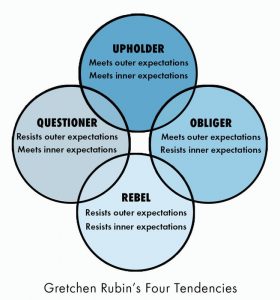New year, new you! Right? Your answer to this question may be a little insight into one of your personality tendencies, and how you can best set yourself up for success on any of those health and fitness goals, resolutions, ideas, notions, leanings you have bouncing around your head.
Have you ever wondered why some people can pick up and maintain a new habit easily, while others struggle to even get started? Or why you used to show up to 5am track practice no problem through high school, but you can’t even bring yourself to think about going for a light jog on weekends?
You already know there is no one single magic process or concept that works for everyone. Some people prefer their coffees black, others with crème, 2 pumps of vanilla and with soy, and others don’t even like coffee; why would there be a one size fits all answer to habit development?
I recently stumbled upon Gretchen Rubin’s book “The Four tendencies,” which says that most personalities fall into one of four main categories. It’s an easy read and very insightful. In fact, it’s helped me gain a better understanding of how others work and how I can best interact with, and support my clients and team.
Rubin describes the tendencies based on how one responds to inner versus outer expectations. Outer expectations would be described as things like the deadline your boss set, rules and guidelines, scheduled meeting times etc. Inner expectations are your OWN expectations rules and deadlines.
Take the Four Tendencies Quiz
While you may have an idea of your tendency (they’re pretty self explanatory), you can take the quiz here.
Obviously the results aren’t telling you that this is WHO YOU ARE and how you’ll always respond but more of a common go-to response. They are tendencies, after all and there is variability within them.
Upholders and New Years Resolution Habits

Upholders are people who respond well to both outer (everyone else) and inner (their own personal) expectations. You’ll know if you’re an upholder because saying “yes” is easy and you love the idea of opportunity, accomplishment, growth and achievement. You might be the kind of person that works a little longer and harder than others, stays up later or comes in early to meet deadlines, and hates letting people (and themselves) down. Upholders might struggle or get frustrated when rules aren’t clear or a project lacks structure.
These individuals tend to be better at forming good habits but can still struggle if they try to take on too many new habits along with their many projects.
Best ways for Upholders to approach New Year Resolutions:
- Use a blend of both internal and external accountability tactics. Internal strategies similar to putting up a gold star (or using an app if you love technology to track habits) for every day you’ve completed your stretch routine can be motivating for upholders. Fit Bits and pedometers have their place for these people. External accountability can take the form of seeing a coach or trainer
- Don’t take on too many goals. Since saying “yes” comes so easily to Upholders, just be aware that you might try and change too many habits at one time. If you find yourself frustrated and not putting out the quality of work / attention to detail that you normally do, or a friend says “maybe you’ve taken on too much” then maybe you’ve taken on too much.
- Others may try to ride your coattails and try to get a boost from your strong levels of motivation to help them along. This isn’t necessarily a bad thing but it could create a new dynamic in the relationship and “your responsibility” to others if you agree to their suggestions “hey let’s go running together, you can pick me up on your route.” Be clear on your own goals and intentions.
- Evaluate your progress. Did you jump on a challenge because it was fun and now it feels like a chore? If you committed to do 5000 steps a day in January, and by March you upped it to 15,000 steps – are you loving it or are you frustrated with maintaining this ritual? This may be a good time to check in and ask if this new habit is still working for you. Just because a habit can be maintained doesn’t mean it has a place in your life.
Questioners and New Years Resolution Habits

Questioners meet only inner expectations. Only outer expectations that fall within a Questioner’s logic or values will be met. Outer expectations that feel non-sensical (like the arbitrary date of January 1st) or rules for rules sake (a speed limit of 50kph along a major thoroughfare), tend to be pushed against. This category is one of the two biggest ones (beside Obligers). You’ll know you are one if you have no problem keeping pace with your own goals, but maybe don’t always listen to your doctor when they tell you to take some pills or start a new habit without doing your own research first. Questioners need to see purpose, benefits and fully understand the why, where, how, who’s of the situation.
If a questioner isn’t meeting deadlines, Rubin commented, “maybe you aren’t meeting your deadlines because you aren’t convinced they are really true.” (As a Questioner, I loved this thought).
Best ways for Questioners to approach New Year Resolutions:
- Focus on the WHY of your new habit.
- You won’t need a ton of external accountability, although it might make the habit formation more pleasurable if you have the right kind of support and they may be help remind you of your goals if you lose sight of your “why.”
- Set a time limit on your research. Questioners can encounter analysis paralysis, or spend so much time in research mode (the best running shoes and running jacket and training programs and watch and GPS…) that the new habit never actually gets started! It may be good just to get moving, then adjust trajectory as you gather data.
- Be flexible in your approach – Some people love consistency and routine, some love “no routine” and still others like structures on some days, and flexibility on the weekends. Don’t be afraid to find the rhythm that works best for you.
Obligers and New Years Resolution Habits

Obligers meet outer expectations but not always inner ones. They tend to be “people pleasers” and are able to meet other people’s needs. They are reliable, make fantastic colleagues, family members and friends but because of this desire to please, they often struggle to say “no” but struggle to meet their own personal goals. If you’re an Obliger, you might need some form of external accountability, such as joining a team or working with a personal trainer to help you establishes appropriate goals and deadlines.
Rubin notes that Obligers are the largest group of the tendencies and often the ones with the most challenges. Reportedly, over 65% of Obligers feel frustrated because they struggle to prioritize their own wants and needs. They rarely give themselves enough time to pursue creative projects or develop new interests.
Best ways for Obligers to approach New Year Resolutions:
- Find an accountability partner or group, and someone that won’t let you off the hook – close friends and family that might say, “it’s the weekend, you deserve to sleep in” might not be the best people to turn to here. Casual friends, people you don’t want to let down or personal trainers work well in this category
- Put money on the line. When it comes to exercise, often this can be in the form of personal training. For some habits and money, you may need to get creative – I’ve also heard of someone saying “if I smoke a cigarette in 100 days, take this money and donate it to the KKK.” There was the double whammy of both failing AND supporting something they despised. It was too easy to donate the money to a good cause like a children’s hospital and justify smoking a cigarette. Ultimately, your motivator doesn’t need to be money, it can be something that is very important to you. You’ll know what that is.
- Weave your goals into your schedule with external accountability built in – while I may be a Questioner, I would never run on my own, so I volunteered to be a leader in a “Learn to run 10k club,” because I knew people were counting on me to show up. Rubin shares a story where two of her readers would work out together, but each person would leave with the other person’s shoe, that way they HAD to show up, or risk sabotaging their friend’s progress.
Rebels and New Years Resolution Habits

Rebels tend to resist both inner and outer expectations. They like to find their own way of doing things, acting from a sense of freedom of their own will, on their own time and without expectation. Rules? No thanks. While Questioners read into the spirit behind the rule and can get on board if the logic is there, Rebels don’t usually regard the reasoning behind the rules and prefer to create their own…even if it’s harder and the outcome is less than desirable. Ruined the soup? Meh, I meant to do that.
Rebels often work well when they are in charge and if they embrace habits that are of their own choosing. If someone asks them to do something, they might decline or change their mind” even if they had been planning on doing it anyways.
Rubin mentions that Rebels are the smallest group of the four tendencies.
Ways Rebels can approach New Year Resolutions:
- Align your desired habits with your values. Create systems to support you to do your habit. What do you feel strongly about, that you can apply to create your habit?
- Fight the power! One of Rubin’s readers said they felt like the junk food industry was trying to brainwash people through ads, so they used their tendency to stay strong against marketing campaigns and cut out junk food and sugar.
- Take it moment by moment. Today is as different from tomorrow as it was from yesterday. Focus on what you want today, and don’t let any expectations cramp your style. If you want to take on this new habit for a month or 6 months, the choice is yours.
Within each tendency, there is some variability on where you might land. For example, you may be like me, Questioner that leans towards being an Obliger, so incorporating some Obliger strategies works really well for me. As you develop and build your habits, use successes and challenges to inform how you might need to adjust your strategies to best work with you.








